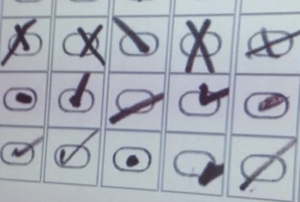
U.S. Senate
See Full Big Line
(D) J. Hickenlooper*
(R) Somebody
80%
20%

Governor
See Full Big Line
(D) Joe Neguse
(D) Phil Weiser
(D) Jena Griswold
60%
60%
40%↓

Att. General
See Full Big Line
(D) M. Dougherty
(D) Alexis King
(D) Brian Mason
40%
40%
30%

Sec. of State
See Full Big Line
(D) George Stern
(D) A. Gonzalez
(R) Sheri Davis
40%
40%
30%

State Treasurer
See Full Big Line
(D) Brianna Titone
(R) Kevin Grantham
(D) Jerry DiTullio
60%
30%
20%

CO-01 (Denver)
See Full Big Line
(D) Diana DeGette*
(R) Somebody
90%
2%

CO-02 (Boulder-ish)
See Full Big Line
(D) Joe Neguse*
(R) Somebody
90%
2%

CO-03 (West & Southern CO)
See Full Big Line
(R) Jeff Hurd*
(D) Somebody
80%
40%

CO-04 (Northeast-ish Colorado)
See Full Big Line
(R) Lauren Boebert*
(D) Somebody
90%
10%

CO-05 (Colorado Springs)
See Full Big Line
(R) Jeff Crank*
(D) Somebody
80%
20%

CO-06 (Aurora)
See Full Big Line
(D) Jason Crow*
(R) Somebody
90%
10%

CO-07 (Jefferson County)
See Full Big Line
(D) B. Pettersen*
(R) Somebody
90%
10%

CO-08 (Northern Colo.)
See Full Big Line
(R) Gabe Evans*
(D) Yadira Caraveo
(D) Joe Salazar
50%
40%
40%

State Senate Majority
See Full Big Line
DEMOCRATS
REPUBLICANS
80%
20%

State House Majority
See Full Big Line
DEMOCRATS
REPUBLICANS
95%
5%
 December 09, 2022 12:39 PM UTC
December 09, 2022 12:39 PM UTC 9 Comments
9 Comments

“Anyway, at some point the 2022 election will in fact end. We’re 99% sure of that.”
But is that 99.49% or less, or 99.51% or more. If the latter, does it call for an automatic reconsideration. If the former, can we get just an adjudicated decision?
I am sorry to say that I am such an election geek, I knew all of that before reading Pols’ post. But good job explaining it to the uninitiated!
Would not conducting the automatic recount in CD3 also flag all of the same votes that were questionable for review, accomplishing the same thing for those votes (except not targeting them specifically) as an adjudicated recount?
Our understanding is that it would not involve re-examining those specific ballots.
Well sumbitch! It oughta.
Actually in a regular recount, for ballots that were adjudicated, only the duplicated ballot is counted, not the original. Now that applies to ones where a bi-partisan team was able to determine a voter's intent. Those with true over and under votes (either voted for two or more candidates same race or no candidates for a race), would be recounted the same way they were counted the first time. So the over votes would be checked again to see if was sign of voter intent and the under votes would be checked again to see if there was just too light a mark (or made in wrong color) for the counter to see.
13th will be interesting but Adam Frisch is confident it won't change a thing. I would love to see the look on Booberts face if she's pitched out into the MAGA darkness like Kari Lake and others of the same ilk.
While it is lovely to think about, the biggest vote change I have ever seen in recounts was 8 votes. And that was in a pretty populous statewide election. I can't remember now if it was Minnesota or Wisconsin, but it was someplace in that part of the country.
Dano, I guess it depends on how you are counting "vote change." The recent Colorado primary recount:
I was referring net gain/loss. In the Peters/Anderson/O'Donnell race that would be net change of -2 votes for O'Donnell. (or you could say net change of +2 for both Peters and Anderson).